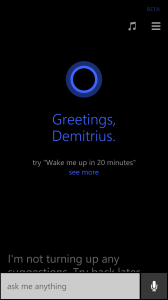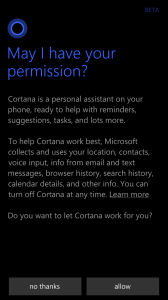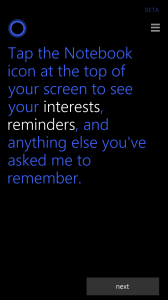Personality Talks: A Cortana, Siri and Google Now Comparison
Dear MNB Readers,
Most of us have experienced voice control software on our phones in the past, whether it was back in the Symbian days with simple yet effective features such as voice dialing with OS level voice commands, 3rd party apps such as Vlingo  or newer and more robust voice driven services such as Apple’s Siri and Google’s Google Now.
While 3rd party solutions (voice command apps) are great for what they can do but they are not as feature rich and powerful as the voice assistants that are integrated in each respective OS. Currently, there are 3 distinct operating systems (OSes), Android, iOS and Windows Phone that are fighting for the hearts, minds and money of consumers around the world. Later this year, Microsoft will launch it’s own advanced and truly personal digital assistant by replacing Windows Phone’s existing TellMe voice command system with Cortana,
After the announcement of Cortana, consumers and journalists have already begun to have questions about what makes Cortana different or better than Siri or Google Now. Windows Phone 8.1 with Cortana isn’t publicly available yet so most of those questions have been unanswered thus far. Fortunately, Fritz Nelson of tom’s HARDWARE has taken the time to do a behind the scenes look at Cortana that sheds new light on what makes Cortana unique and how those things enable Cortana to do things that we have never seen before.
Here are a few quotes from the article: How Microsoft Cortana Improves Upon Siri and Google Now
While it is tempting to dismiss Cortana, the new personal digital assistant for Windows Phone 8.1, as Microsoft’s answer to Apple’s Siri for the iPhone or Google Now for Android, as yet another spin on the company’s old tactic of being the fast follower and not the innovator, keep in mind that in the hotly contested mobile arena, imitation is a considerable art form. See: Apple vs. Samsung, rounds one and two; Microsoft’s initial dismissive stance on tablets
; Apple’s early dismissive stance on small tablets; Apple Maps; Google Play Music; Apple iTune Radio. Etc…..
…..In addition to making Cortana available for some limited hands-on testing, Microsoft hosted a small Bing platform break-out session for the press and analysts, during which Bing executives held forth solely on Cortana. Afterward, I sat down with Stefan Weitz, director of search for Microsoft Bing to learn more about what powers Cortana, and to dive into the areas that make the technology sound so promising.
I agree with Fritz’s opening paragraphs as it is easy for consumers to dismiss Cortana as being a me-too product or Microsoft’s Siri/Now. Fortunately, Fritz goes into greater detail by explaining what is currently different about Cortana based on real world usage and direct comparisons to the answers returned by Siri and Google Now when they are asked the same questions.
Here are a few additional quotes from Fritz:
Cortana began 18 months ago as a collaboration between Microsoft’s Windows Phone and Bing groups, when Michael Calcagno, previously in Microsoft’s natural language group, took on the role of architect for the Bing Information Platform. The Bing service already contained all of Cortana’s key pieces, like visual recognition (recognition of physical objects) and the ability to make inferences. Microsoft just needed to build a platform to bring it together.
Microsoft had previously built an entity database
, the technology that understands people, places, and things, and their relationships to other entities. The company dubs that technology “Satori,” and it’s what powers a search result that provides not just the simple answer to the question you asked, but all related information around it.
Microsoft has also been working on speech recognition, using deep neural networks (DNNs) to accomplish pattern recognition based on the way human brains process information. Waveforms are translated into bits and given to a speech recognition system, where natural language processing starts to make inferences about the user’s intent….
The real magic is shown in the section titled 5 Key Cortana Differences:
1.) Context…
2.) Inference…
3.) Transparency & Customization…
4.) Self-tuning…
5.) Cortana APIs…
Fritz goes into detail about each of those 5 key differences and other behind the scenes elements that bring Cortana to life in very unique ways. The article is a great read that will help us get a better understanding of what to expect when Cortana arrives via the Windows Phone 8.1 update in the coming weeks (via the Developer Preview) and the coming months around the world.
I own Windows Phone, iOS and Android devices so you can rest assured that MNB will have our very own Cortana, Siri and Google Now comparisons in due time. Until then, I invite you to visit Tom’s HARDWARE to get more information about Cortana and how it compares to the fierce competition. After reading the article, if you would be so kind, please come back to MNB and leave a comment about your expectations for Cortana or your experience with voice assistants on other platforms. How about Windows Phone’s current TellMe system? Do you use it? If you don’t, will you use Cortana?
Source: tom’s HARDWARE
As always, thank you for choosing MyNokiaBlog!
Sincerely,
Demitrius Harris
Category: Applications, Lumia, Nokia, Windows Phone








Connect
Connect with us on the following social media platforms.